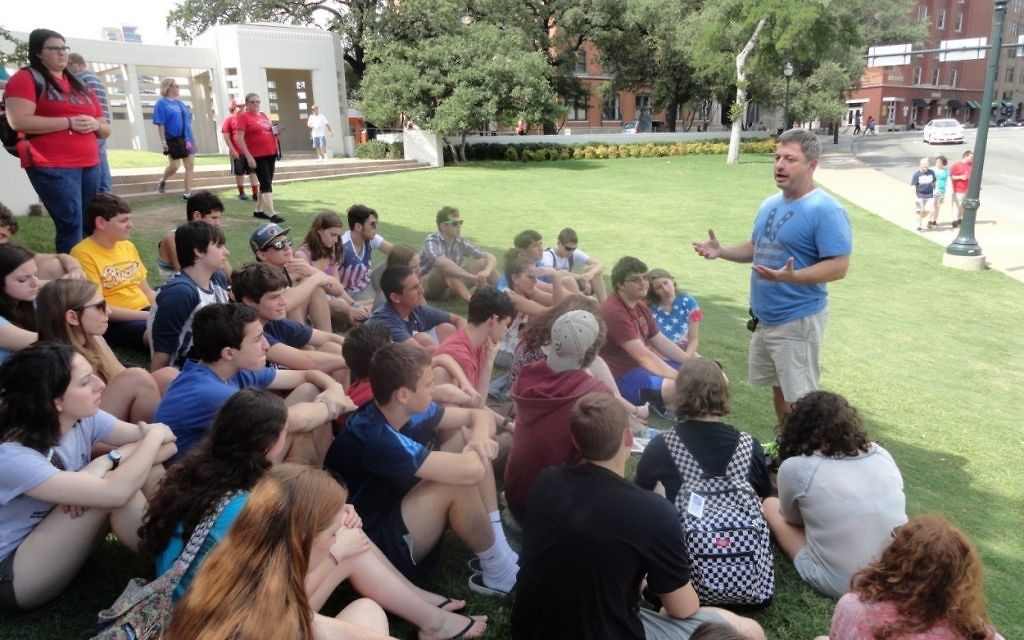Etgar 36: Conversations Can Turn ‘Other’ Into Just Another
The compilers of the Talmud understood the need to include winning and losing sides of a debate.

Dec. 21, 1988, was the night before my birthday, and I was still on the Syracuse University campus because of winter exams. My friends who were also still at school were taking me out to celebrate when we heard about the tragedy of Pan Am 103.
The plane exploded in midair because of a bomb placed on it by a Libyan terrorist. Thirty-five of my fellow students from Syracuse, including a former roommate, Grateful Dead touring friends and other friends, were on board, coming home from studying abroad.
A lifelong lesson was learned that night: that my life is connected to people and events that I do not even know about. I began to think, “What if people who acted out of fear, ignorance and hatred toward others would funnel that same energy into just getting to know others? Could we avoid tragic events?”
Get The AJT Newsletter by email and never miss our top stories Free Sign Up
Acting out of fear toward others is nothing new. We read in the Torah that there came a new Pharaoh upon Egypt who did not know Joseph, and when he saw how numerous our people were becoming, he acted out of fear. Instead of getting to know us, he enslaved us, beginning our Passover narrative.
Speaking to people who don’t think like us, look like us, pray like us or vote like us may not sound like fun or a good use of time, but that kind of engaging is the way we move from viewing people as the “other” to just “another” human. It will help us stop demonizing and ignoring one another and learn to work together to understand one another.
Hearing multiple voices of debate is a very Jewish idea. The compilers of the Talmud understood the need to make sure the winning and losing sides of a debate were included because what won the argument one day might not be what we follow later and vice versa.
The summer program I created, Etgar 36, takes teens on a journey across America to sit and speak with all sides of political issues so that the participants can test-drive their thoughts, education and opinions as well as step out of their echo chamber.
One of the main lessons we learn is to begin these hard conversations just by finding something you have in common — a movie, sports team, musician, etc. — and move forward from there.
After hearing from a conservative activist about his opposition to marriage equality, one of the participants raised her hand and told the speaker, “There is nothing I agree with you on, and there is nothing about you I like.” The speaker responded, “There is nothing you like?” “I like your shoes” was her answer.
Without missing a beat, the speaker said, “OK, let’s begin our connection there.”
Once we make a basic human connection, we can elevate the conversation to the harder questions and exchanges.
The teens on Etgar 36 meet with Daryl Davis, an African-American blues musician who accidentally befriended a member of the KKK. After finding whatever common ground they had, they got to the bigger questions because Daryl wanted an answer to the question of how the man could hate him if he didn’t even know him.
After holding many conversations and getting to know each other better, the Klansman realized his hatred and fear were misplaced and unfounded. He and others ended up leaving the Klan.
May this High Holiday season be the time that we realize the need to reach across the divide and have conversations with people we have dismissed as the “other.” This is where the real work — the repairing and changing of the world, the understanding of each other — begins.
May this be the year we begin to humanize the quote above many arks: “Da l’fnei mee atah omed” — know before whom you stand. Yes, it is referring to G-d, but may we begin to think it also can mean knowing the godliness in the human being standing in front of us and recognizing that more unites us than divides us.
Billy Planer is the founder and director of Etgar 36 (www.etgar.org).




comments